- Home
- Social Studies
- Spanish in America
Spanish Explorers in America
Although the first Europeans to reach North America were probable the Vikings, the Spanish explorers in America were to have extensive impact on the newly recognized continent.
Spain and Portugal
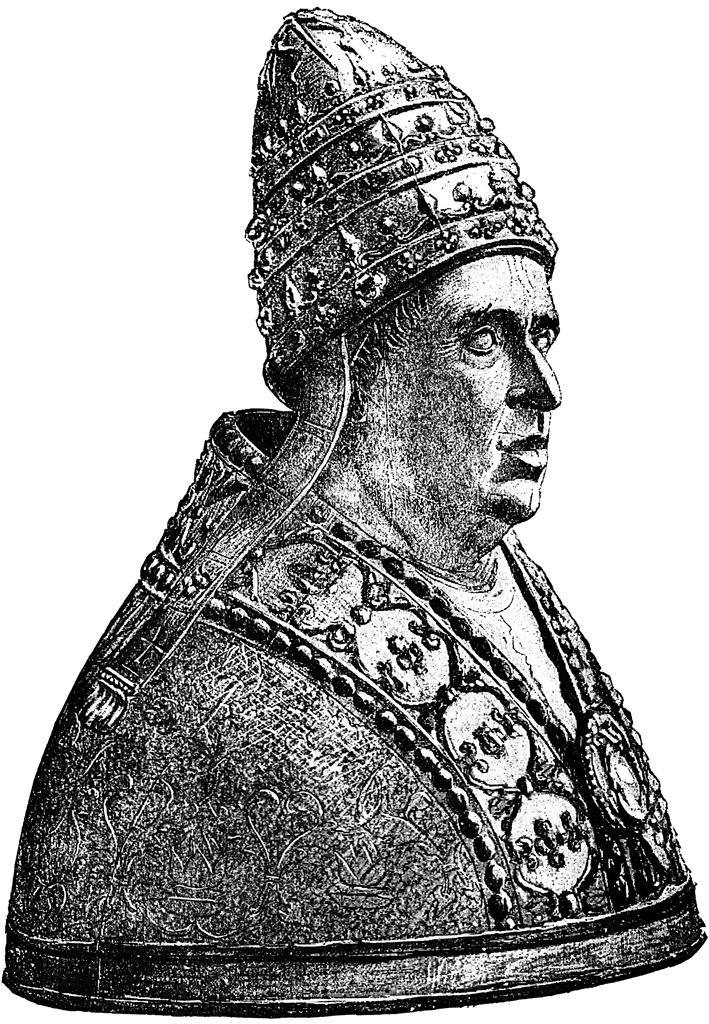 Pope Alexander VI
Pope Alexander VIAt the time of Columbus’ voyages to the Americas, the Pope, who had more power than individual rulers, declared in 1494 that the entire New World belonged to Spain, except for the Brazil area which the Pope designated for Portugal. Spanish explorers in America ambitions included first to to defend the claim to vast territories, second, to extend Christianity throughout the empire, and third, to gain new riches, such as gold and silver.
Worlds collide
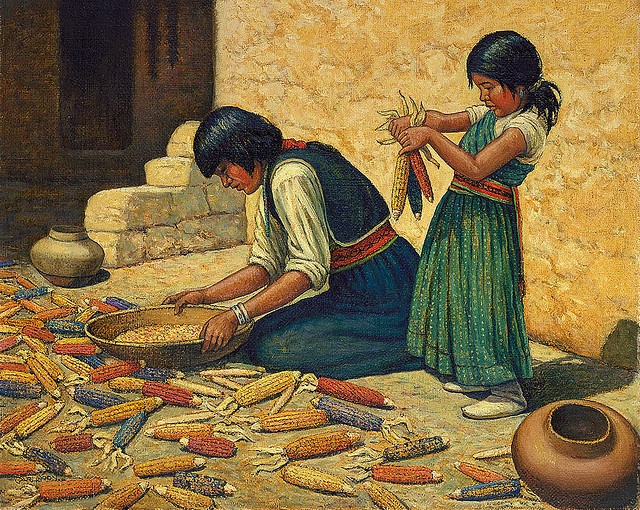 Corn or maize is a very diverse species of grass native to the Americas that has been grown for millennia by native cultures. It was domesticated by indigenous peoples in Mesoamerica in prehistoric times, and spread through much of the Americas in pre-Columbian times.
Corn or maize is a very diverse species of grass native to the Americas that has been grown for millennia by native cultures. It was domesticated by indigenous peoples in Mesoamerica in prehistoric times, and spread through much of the Americas in pre-Columbian times.Unexpectedly, among the most important resources Europeans found in the New World were the new crops of corn and potatoes. These crops and other foods indigenous to the Americas, such as beans, tomatoes, and peanuts were brought to Europe and Africa by travelers who had visited the Americas. Because they were cheap, easy-to-grow basic foods full of essential vitamins, they soon became important foods for areas that had nothing like them.
What the Europeans brought to the peoples of America included horses, pigs and cows and plants such as wheat and sugarcane. What the peoples of the New World did not welcome was European diseases such as smallpox – causing epidemics, killing thousands.
Ponce de León
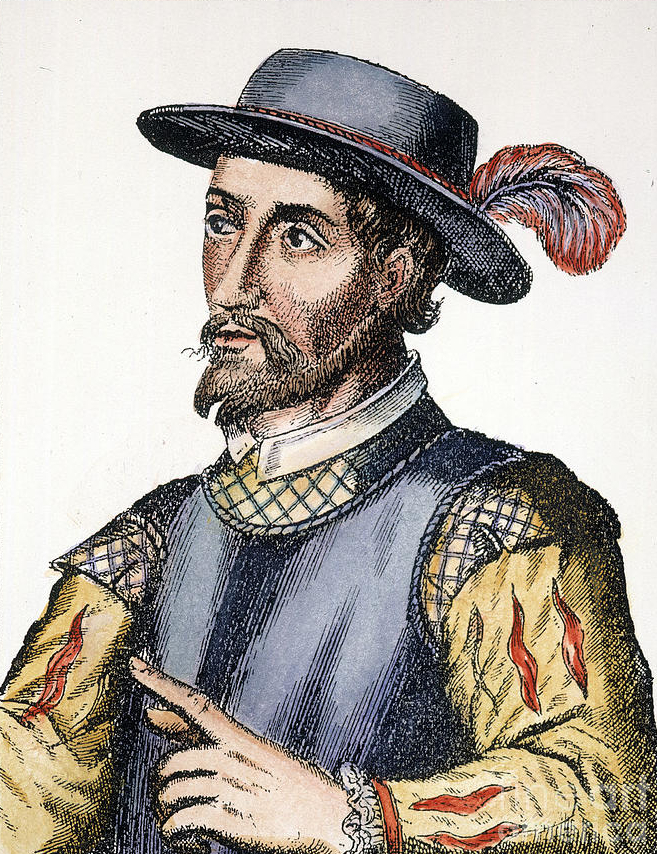 Ponce de León (c. 1460-1521)
Ponce de León (c. 1460-1521)Nevertheless, Spain continued to lay claim by sending explorers to areas beyond where Christopher Columbus landed. Another of the Spanish explorers in America was Ponce de León who first came to the Americas as a "gentleman volunteer" among 1200 sailors on Christopher Columbus’ second expedition in 1493. He was authorized by the Spanish crown to explore the neighboring island of Puerto Rico in 1508 and to take office as the first Governor of Puerto Rico by appointment in 1509.
Ponce de León then led the first known European expedition to the North American continent - during the Easter feast period of 1513, he landed at what he thought was an island; he named the area La Florida and claimed it for Spain.
Hernando de Soto
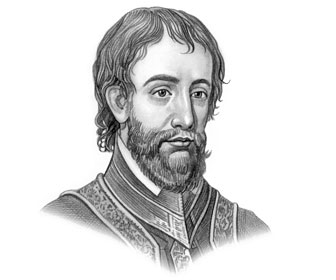 Hernando de Soto (c. 1497-1542)
Hernando de Soto (c. 1497-1542)A quarter century after Ponce de León made his claim for Spain, another of the Spanish explorers in America, Hernando de Soto, landed in western Florida with 600 men. From there, compelled by a desire for treasure, De Soto went on an epic trek that took him across much of the uncharted continent. As a result, Spain was the first European nation to gain any knowledge of the interior of North America. De Soto never did find his treasure, but it is likely that he was the first white man to cross the Mississippi River.
Pedro Menéndez de Avilés
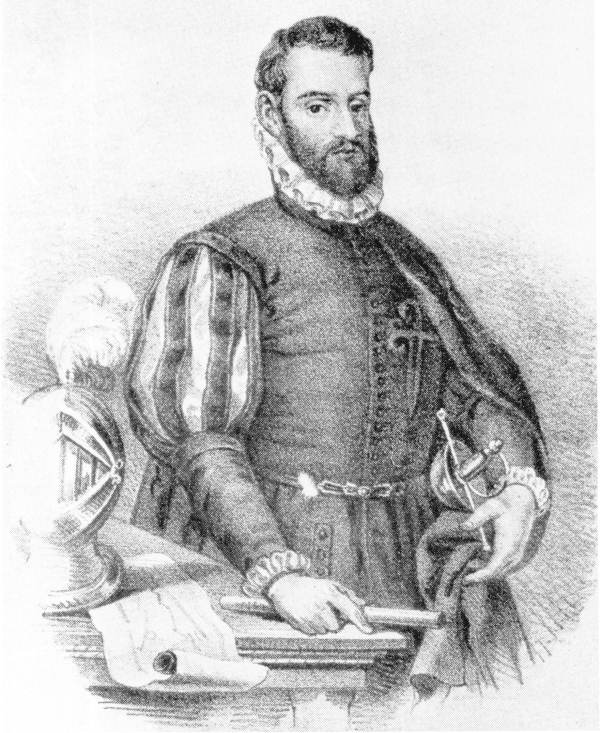 Pedro Menéndez de Avilés (1519-1574)
Pedro Menéndez de Avilés (1519-1574)In 1565, the first European town and the city in present-day United States was established by Pedro Menéndez de Avilés. On the site of an old indigenous - ”Indian” village, he set up a colony and defensive outpost to defend against the French, who were beginning to encroach on Spanish territory. He named the spot Saint Augustine because he arrived on that saint’s feast day.
Spanish Explorers in America
 The line of demarcation set in 1494 is called the Linea de Tordesillas.
The line of demarcation set in 1494 is called the Linea de Tordesillas.The Treaty of Tordesillas that established a line of demarcation would be observed fairly well by Spain and Portugal, despite considerable ignorance as to the geography of the New World. However, the treaty omitted all of the other European powers.
Those countries generally ignored the treaty. By the end of the century, other nations were laying claim to the great North American territories and Spain's hold dwindled, although it remained strong in South America. New Spain continued to dominate the American territories for centuries in spite of challenges arising from other empires, especially those of England and Holland. Even after the American Revolution, Spain still occupied all of the land west of the Mississippi as well as the territory of Mexico and into Central America and into South America.
|
Aunque probablemente los vikingos hayan sido los primeros europeos que llegaron a América del Norte, los expañoles fueron los primeros en hacer un verdadero impacto en el continente. El Papa, que tenía en la época del viaje de Colón mas poder que cada uno de los soberanos, declaró que todo el Nuevo Mundo pertenecía a España, salvo el Brasil, que concedió a Portugal. Era necesario que España hiciera valer este derecho y, por cierto, España deseaba extender el cristianismo a través de todo el imperio así como obtener también nuevas riquezas. |
Okay, so now I've put on some ads from Amazon - from which I may earn a few cents. (2025)



